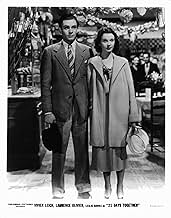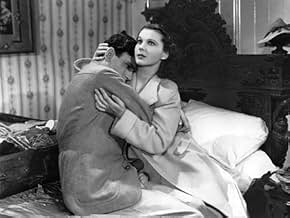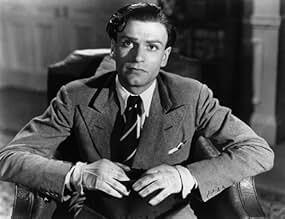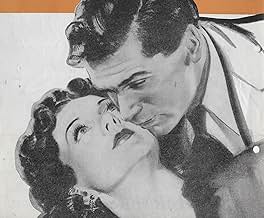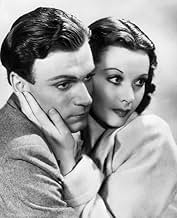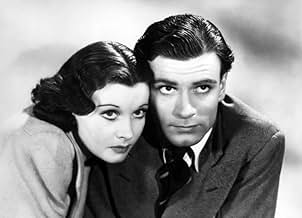CALIFICACIÓN DE IMDb
6.1/10
1.4 k
TU CALIFICACIÓN
Después de que Larry Darrent mata accidentalmente al exmarido de su amante, otra persona es arrestada por el crimen. Larry y Wanda tienen tres semanas antes del juicio. Larry planea entregar... Leer todoDespués de que Larry Darrent mata accidentalmente al exmarido de su amante, otra persona es arrestada por el crimen. Larry y Wanda tienen tres semanas antes del juicio. Larry planea entregarse y su hermano abogado lo intentará evitar.Después de que Larry Darrent mata accidentalmente al exmarido de su amante, otra persona es arrestada por el crimen. Larry y Wanda tienen tres semanas antes del juicio. Larry planea entregarse y su hermano abogado lo intentará evitar.
- Dirección
- Guionistas
- Elenco
Elliott Mason
- Frau. Grunlich
- (as Elliot Mason)
Howard Douglas
- Man Asking for Cigarette
- (sin créditos)
- Dirección
- Guionistas
- Todo el elenco y el equipo
- Producción, taquilla y más en IMDbPro
Opiniones destacadas
he film begins with two happy lovers (Laurence Olivier and Vivian Leigh) returning to her home. There, waiting for her is her husband--a man who she hasn't seen in three years. He demands money and then attacks Olivier--trying to stab him. In self-defense, Olivier kills the husband and dumps his body in an alley. He then visits his brother, a respected judge (Leslie Banks) and confesses. However, the brother surprisingly does NOT want him to go the police--which is odd, since it was a case of self-defense. It seems that he doesn't want this dirty laundry to be aired in public. For a time, things appear fine...until some other guy is arrested for the killing. Olivier cannot allow this to happen but his brother encourages him to be quiet--the defendant is sure to be found innocent. But, as the trial progresses, things look worse and worse for the defendant. And, all the while his brother, a respected judge, encourages the couple to leave the country and forget about the case. The problem is that Olivier's character has character--much more than his supposedly upright and respectable brother.
While the story is very simple and relatively easy to predict (though the ending was a bit of a twist), I liked the idea of two brothers who appear one way but are the opposite. Olivier's character is a bit of a rotter--gambling and living a rather frivolous life--but down deep, he has a conscience. His proper brother, however, is truly evil and can live with an innocent man being convicted and hung! Because it is a very good film, it is perplexing why Gainsborough Pictures shelved this movie for three years before finally releasing it. I'd love to know why.
While the story is very simple and relatively easy to predict (though the ending was a bit of a twist), I liked the idea of two brothers who appear one way but are the opposite. Olivier's character is a bit of a rotter--gambling and living a rather frivolous life--but down deep, he has a conscience. His proper brother, however, is truly evil and can live with an innocent man being convicted and hung! Because it is a very good film, it is perplexing why Gainsborough Pictures shelved this movie for three years before finally releasing it. I'd love to know why.
Apparently this is one of those Galsworthy dilemma stories. In it Olivier, early in his career inadvertently kills a man, the estranged husband of his new love. He is faced with the considerable struggle with conscience because a man has been blamed for the act and will face the music. What to do. What to do. We are put in the position of hoping all will somehow work out. I won't spoil the ending, but I will say that Olivier's character could have been sent to the gallows for terminal boredom. At no point did I really care one way or the other. He is selfish in many ways and rather cowardly. While the victim is made to have no redeeming qualities, his death really serves nothing other than that of a plot element. I suppose there is some of that stiff upper lip stuff going on, but at no time did I sit on the edge of my seat. Contrast this to the pain of Jean Valjean who faces a similar question. In that we all need to look inward. This just didn't ask much of me, and I was also greatly disappointed with the conclusion.
21 Days is directed by Basil Dean and adapted to screenplay by the director and Graham Greene from John Galsworthy's play The First and Last. It stars Vivien Leigh, Laurence Olivier, Leslie Banks, Francis L. Sullivan and David Horne.
When Larry Durrant (Olivier) accidentally kills his lover's husband, he decides to hide his crime and the couple embark on a whirlwind romance for the next twenty one days. However, with an innocent dupe on trial for the murder, Durrant's conscience begins to get the better of him.
If it didn't feature Olivier and Leigh then this would have been consigned to the forgotten bin and sealed up post haste. That the stars give it a curiosity value is a given, but one peak at the meagre back story backs up the fact that it really is rather a dull movie. Film was wrapped in 1938 but sat on the shelf for two years and was only released once Olivier and Leigh became big names in 1940. The two stars were more interested in playing footsie under the table than putting any acting depth into the production, something which greatly annoyed director Dean as he was trying to make a gripping crime drama. In fact Viv and Larry were so unhappy with how the film ended up, they reportedly walked out of a screening of it at the halfway point!
Picture is clearly meant to be a scathing observation on the folly of criminal law, wrapped around a male protagonist battling his moral codes as his heart goes pitter patter for a dame. Yet the picture rarely reaches dramatic heights, playing out more as a movie about young lovers inconvenienced by an accident, than one about a cruel twist of fate so pay your penance you loser. Olivier gives good quality mental anguish, again that is a given, but Leigh is just on the sidelines looking pretty and rarely impacting on the narrative. The other cast members work well enough, but everyone seems confused as to just what sort of tone to aim for, in fact taking their queues from Larry and Viv. While the ending lacks an edge, playing out more as a cheap cop out than anything else, geared once again towards how lovely the central couple are together.
Somehow finding its way into a British film noir DVD collection, that's a bit of a bum steer. However, little snippets of visual pleasures do provide bright spots in the viewing experience. The few scenes involving a foggy London of wet back streets and street lamps hint at where the director hoped his movie would dwell, and with cinematographer Jan Stallick photographing continually with shadows prominent, there's just enough to keep it from being a complete wash out on the tech side of things. Ultimately it's very disjointed, a tonally confusing picture in search of a more dramatic and thrilling home, director Dean knew it, producer Alexander Korda knew it, and crucially, so did Olivier and Leigh. Only the most staunch (biased) fans of the two stars can seriously think this is a good movie. 5/10
When Larry Durrant (Olivier) accidentally kills his lover's husband, he decides to hide his crime and the couple embark on a whirlwind romance for the next twenty one days. However, with an innocent dupe on trial for the murder, Durrant's conscience begins to get the better of him.
If it didn't feature Olivier and Leigh then this would have been consigned to the forgotten bin and sealed up post haste. That the stars give it a curiosity value is a given, but one peak at the meagre back story backs up the fact that it really is rather a dull movie. Film was wrapped in 1938 but sat on the shelf for two years and was only released once Olivier and Leigh became big names in 1940. The two stars were more interested in playing footsie under the table than putting any acting depth into the production, something which greatly annoyed director Dean as he was trying to make a gripping crime drama. In fact Viv and Larry were so unhappy with how the film ended up, they reportedly walked out of a screening of it at the halfway point!
Picture is clearly meant to be a scathing observation on the folly of criminal law, wrapped around a male protagonist battling his moral codes as his heart goes pitter patter for a dame. Yet the picture rarely reaches dramatic heights, playing out more as a movie about young lovers inconvenienced by an accident, than one about a cruel twist of fate so pay your penance you loser. Olivier gives good quality mental anguish, again that is a given, but Leigh is just on the sidelines looking pretty and rarely impacting on the narrative. The other cast members work well enough, but everyone seems confused as to just what sort of tone to aim for, in fact taking their queues from Larry and Viv. While the ending lacks an edge, playing out more as a cheap cop out than anything else, geared once again towards how lovely the central couple are together.
Somehow finding its way into a British film noir DVD collection, that's a bit of a bum steer. However, little snippets of visual pleasures do provide bright spots in the viewing experience. The few scenes involving a foggy London of wet back streets and street lamps hint at where the director hoped his movie would dwell, and with cinematographer Jan Stallick photographing continually with shadows prominent, there's just enough to keep it from being a complete wash out on the tech side of things. Ultimately it's very disjointed, a tonally confusing picture in search of a more dramatic and thrilling home, director Dean knew it, producer Alexander Korda knew it, and crucially, so did Olivier and Leigh. Only the most staunch (biased) fans of the two stars can seriously think this is a good movie. 5/10
Although released in 1940 this picture was made in 1937, well before Leigh and Olivier were married. Producer Alexander Korda intended it as a career-boosting role for Leigh but, for whatever reasons, it was put-aside. Columbia bought the property in 1939 and released it after Leigh's success in "Gone with the wind".
The 1937 date explains what must seem to be an anomaly for modern audiences - the sympathetic treatment of the "Axis" characters, ie the German landlord and the Italian grocer.
Well-worth watching - the depth of talent in the supporting roles (Francis L Sullivan, Hay Petrie, Robert Newton etc) is notable.
The 1937 date explains what must seem to be an anomaly for modern audiences - the sympathetic treatment of the "Axis" characters, ie the German landlord and the Italian grocer.
Well-worth watching - the depth of talent in the supporting roles (Francis L Sullivan, Hay Petrie, Robert Newton etc) is notable.
You'll get hooked on this right away but then annoyed at the way it takes so long to get to the point. Director, Basil Dean's lugubrious pace and humourless direction tries too hard to build tension rather than developing the story or making us get to know his cast.
According to Mr Dean he was not entirely to blame. Studio boss Alexander Korda was so underwhelmed by Dean's direction that he started to re-shoot and rewrite scenes himself. This conflict gives the picture a disjointed feel but the main issue is that the balance is really wrong. About half the film is taken up by the (anti) climatic court case which is meant to get you on the edge of your seat. It achieves that ambition but only because you're yelling "get on with it!" This is one of the dullest court room scenes I've seen - where is William Powell or a Barrymore brother when you need them ? What's sacrificed for this pseudo-arty tension trope is that we don't get time to know the characters straight away. More time should have been devoted to that because it takes too long to draw you in.
On the plus side, it looks good, it's full of mood, clever lighting and the inevitable 1930s London fog - the camerawork also is pretty impressive. The acting, as you'd expect from this lot is first rate but it's the story which doesn't grab you. Such a tale about abuse, murder, deception and blackmail handled by another director could have been the most exciting thing since sliced bread but this is actually less exciting than that aforementioned piece of bread.
What does eventually makes you sit up and take notice is the brilliant cameo from Hay Petrie as a down and out ex-vicar. You then wish you'd been paying more attention earlier! That's what happens with this - once you've started you really want to find out what happens next but your brain keeps trying to switch off.
Despite what some reviewers have said, this is not a bad film - it's just frustrating because you know that it could have been made better. For example, had Hitchcock been in the chair this might have been a classic. As it stands it's just ok.
One interesting thing to see is Mr Olivier not playing the alpha male - as the weak willed looser, the unsuccessful brother, he's remarkably believable. That's until you realise that this young actor has, just a few weeks earlier married probably the most beautiful woman in the world.
According to Mr Dean he was not entirely to blame. Studio boss Alexander Korda was so underwhelmed by Dean's direction that he started to re-shoot and rewrite scenes himself. This conflict gives the picture a disjointed feel but the main issue is that the balance is really wrong. About half the film is taken up by the (anti) climatic court case which is meant to get you on the edge of your seat. It achieves that ambition but only because you're yelling "get on with it!" This is one of the dullest court room scenes I've seen - where is William Powell or a Barrymore brother when you need them ? What's sacrificed for this pseudo-arty tension trope is that we don't get time to know the characters straight away. More time should have been devoted to that because it takes too long to draw you in.
On the plus side, it looks good, it's full of mood, clever lighting and the inevitable 1930s London fog - the camerawork also is pretty impressive. The acting, as you'd expect from this lot is first rate but it's the story which doesn't grab you. Such a tale about abuse, murder, deception and blackmail handled by another director could have been the most exciting thing since sliced bread but this is actually less exciting than that aforementioned piece of bread.
What does eventually makes you sit up and take notice is the brilliant cameo from Hay Petrie as a down and out ex-vicar. You then wish you'd been paying more attention earlier! That's what happens with this - once you've started you really want to find out what happens next but your brain keeps trying to switch off.
Despite what some reviewers have said, this is not a bad film - it's just frustrating because you know that it could have been made better. For example, had Hitchcock been in the chair this might have been a classic. As it stands it's just ok.
One interesting thing to see is Mr Olivier not playing the alpha male - as the weak willed looser, the unsuccessful brother, he's remarkably believable. That's until you realise that this young actor has, just a few weeks earlier married probably the most beautiful woman in the world.
¿Sabías que…?
- TriviaThe film was shot in 1937 but released on January 7, 1940. William Dewhurst (Lord Chief Justice) died on October 26, 1937. His only child, Paul, died in 1937 fighting in the Spanish Civil War, only a few months before Dewhurst's own demise.
- ErroresAt the end, when Wanda (Vivien Leigh) is chasing Larry (Laurence Olivier) through the streets, she isn't carrying anything. The camera goes to Larry, and when it goes back to her, she's carrying a newspaper as she's still running. Once again the camera goes back to Larry, and the next shot of her, she once again isn't carrying a newspaper but stops to buy one then continues to run after him.
- ConexionesFeatured in The Making of a Legend: Gone with the Wind (1988)
Selecciones populares
Inicia sesión para calificar y agrega a la lista de videos para obtener recomendaciones personalizadas
- How long is 21 Days Together?Con tecnología de Alexa
Detalles
- Fecha de lanzamiento
- País de origen
- Idiomas
- También se conoce como
- 21 Days Together
- Locaciones de filmación
- Southend-on-Sea, Essex, Inglaterra, Reino Unido(Kursaal amusement park visited by Larry and Wanda)
- Productora
- Ver más créditos de la compañía en IMDbPro
- Tiempo de ejecución1 hora 12 minutos
- Color
- Relación de aspecto
- 1.37 : 1
Contribuir a esta página
Sugiere una edición o agrega el contenido que falta

Principales brechas de datos
By what name was Tres semanas juntos (1940) officially released in India in English?
Responda
